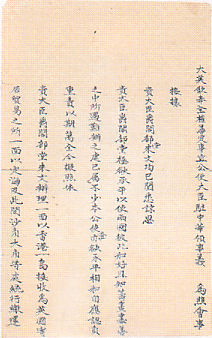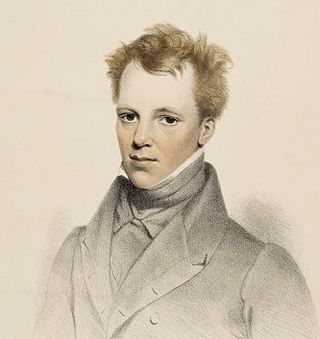Related Research Articles

The First Opium War, also known as the Opium War or the Anglo-Sino War was a series of military engagements fought between Britain and the Qing dynasty of China between 1839 and 1842. The immediate issue was the Chinese enforcement of their ban on the opium trade by seizing private opium stocks from merchants at Canton and threatening to impose the death penalty for future offenders. Despite the opium ban, the British government supported the merchants' demand for compensation for seized goods, and insisted on the principles of free trade and equal diplomatic recognition with China. Opium was Britain's single most profitable commodity trade of the 19th century. After months of tensions between the two nations, the British navy launched an expedition in June 1840, which ultimately defeated the Chinese using technologically superior ships and weapons by August 1842. The British then imposed the Treaty of Nanking, which forced China to increase foreign trade, give compensation, and cede Hong Kong to the British. Consequently the opium trade continued in China. Twentieth century nationalists consider 1839 the start of a century of humiliation, and many historians consider it the beginning of modern Chinese history.

The Second Opium War, also known as the Second Anglo-Sino War, the Second China War, the Arrow War, or the Anglo-French expedition to China, was a colonial war lasting from 1856 to 1860, which pitted the British Empire and the French Empire against the Qing dynasty of China.

The Opium Wars were two conflicts waged between China and Western powers during the mid-19th century. The First Opium War was fought from 1839 to 1842 between China and the United Kingdom, and was triggered by the Chinese government's campaign to enforce its prohibition against opium trafficking by British merchants. The Second Opium War was waged by Britain and France against China from 1856 to 1860. In each war, the superior military advantages enjoyed by European forces led to several easy victories over the Chinese military, with the consequence that China was compelled to sign unequal treaties to grant favourable tariffs, trade concessions, reparations and territory to Western powers.

Lin Zexu, courtesy name Yuanfu, was a Chinese political philosopher and politician. He was the head of states (Viceroy), Governor General, scholar-official, and under the Daoguang Emperor of the Qing dynasty best known for his role in the First Opium War of 1839–42. He was from Fuzhou, Fujian Province. Lin's forceful opposition to the opium trade was a primary catalyst for the First Opium War. He is praised for his constant position on the "moral high ground" in his fight, but he is also blamed for a rigid approach which failed to account for the domestic and international complexities of the problem. The Emperor endorsed the hardline policies and anti-drugs movement advocated by Lin, but placed all responsibility for the resulting disastrous Opium War onto Lin.

Arthur David Waley was an English orientalist and sinologist who achieved both popular and scholarly acclaim for his translations of Chinese and Japanese poetry. Among his honours were the CBE in 1952, the Queen's Gold Medal for Poetry in 1953, and he was invested as a Companion of Honour in 1956.

Keying, also known by his romanized Mandarin Chinese name Qiying or Ch'i-ying (Wade–Giles) and his Manchu name Kiyeng, was a Manchu statesman during the Qing dynasty of China. An imperial clansman of the house of Aisin Gioro, he began his career in the Imperial Clan Court. He conducted several peace treaties with Western powers, beginning with the Treaty of Nanking, which ended the First Opium War with Britain in 1842. Keying was sent to negotiate again in 1858 to settle the Arrow War with Britain and France, but the settlement was repudiated by the Xianfeng Emperor and he was forced to commit suicide.

Karl Friedrich August Gützlaff, anglicised as Charles Gutzlaff, was a German Lutheran missionary to the Far East, notable as one of the first Protestant missionaries in Bangkok, Thailand (1828) and in Korea (1832). He was also the first Lutheran missionary to China. He was a magistrate in Ningpo and Chusan and the second Chinese Secretary of the British administration in Hong Kong.

The Canton System served as a means for Qing China to control trade with the West within its own country by focusing all trade on the southern port of Canton. The protectionist policy arose in 1757 as a response to a perceived political and commercial threat from abroad on the part of successive Chinese emperors.

The Convention of Chuenpi was a tentative agreement between British Plenipotentiary Charles Elliot and Chinese Imperial Commissioner Qishan during the First Opium War between the United Kingdom and the Qing dynasty of China. The terms were published on 20 January 1841, but both governments rejected them and dismissed Elliot and Qishan, respectively, from their positions. Foreign Secretary Lord Palmerston stated that Elliot acquired too little while the Daoguang Emperor believed Qishan conceded too much. Palmerston appointed Major-General Henry Pottinger to replace Elliot, while the emperor appointed Yang Fang to replace Qishan, along with Yishan as General-in-Chief of Repressing Rebellion and Longwen as an assistant regional commander. Although the convention was unratified, many of the terms were later included in the Treaty of Nanking (1842).

The Thirteen Factories, also known as the Canton Factories, was a neighbourhood along the Pearl River in southwestern Guangzhou (Canton) in the Qing Empire from c. 1684 to 1856 around modern day Xiguan, in Guangzhou's Liwan District. These warehouses and stores were the principal and sole legal site of most Western trade with China from 1757 to 1842. The factories were destroyed by fire in 1822 by accident, in 1841 amid the First Opium War, and in 1856 at the onset of the Second Opium War. The factories' importance diminished after the opening of the treaty ports and the end of the Canton System under the terms of the 1842 Anglo-Chinese Treaty of Nanking. After the Second Opium War, the factories were not rebuilt at their former site south of Guangzhou's old walled city but moved, first to Henan Island across the Pearl River and then to Shamian Island south of Guangzhou's western suburbs. Their former site is now part of Guangzhou Cultural Park.

Wei Yuan, born Wei Yuanda (魏遠達), courtesy names Moshen (默深) and Hanshi (漢士), was a Chinese scholar from Shaoyang, Hunan. He moved to Yangzhou, Jiangsu in 1831, where he remained for the rest of his life. Wei obtained the provincial degree (juren) in the Imperial examinations and subsequently worked in the secretariat of several statesmen such as Lin Zexu. Wei was deeply concerned with the crisis facing China in the early 19th century; while he remained loyal to the Qing Dynasty, he also sketched a number of proposals for the improvement of the administration of the empire.
Qishan, courtesy name Jing'an, was a Mongol nobleman and official of the late Qing dynasty. He was of Khalkha Mongol and Borjigit descent, and his family was under the Plain Yellow Banner of the Manchu Eight Banners. He is best known for negotiating the Convention of Chuanbi on behalf of the Qing government with the British during the First Opium War of 1839–42.

The I Ching or Yi Jing, usually translated Book of Changes or Classic of Changes, is an ancient Chinese divination text that is among the oldest of the Chinese classics. Originally a divination manual in the Western Zhou period (1000–750 BC), the I Ching was transformed over the course of the Warring States and early imperial periods (500–200 BC) into a cosmological text with a series of philosophical commentaries known as the "Ten Wings". After becoming part of the Five Classics in the 2nd century BC, the I Ching was the subject of scholarly commentary and the basis for divination practice for centuries across the Far East, and eventually took on an influential role in Western understanding of East Asian philosophical thought.

The Battle of Ningpo was an unsuccessful Chinese attempt to recapture the British-occupied city of Ningbo (Ningpo) during the First Opium War. British forces had bloodlessly captured the city after their victory at Chinhai, and a Chinese force under the command of Prince Yijing was sent to recapture the city but was repulsed, suffering heavy casualties. The British eventually withdrew from the city the following spring.

Guan Tianpei was a Chinese admiral of the Qing dynasty who served in the First Opium War. His Chinese title was "Commander-in-Chief of Naval Forces". In 1838, he established courteous relations with British Rear-Admiral Frederick Maitland. Guan fought in the First Battle of Chuenpi (1839), the Second Battle of Chuenpi (1841), and the Battle of the Bogue (1841). The British account described his death in the Anunghoy forts during the Battle of the Bogue on 26 February 1841 as follows:
Among these [Chinese officers], the most distinguished and lamented was poor old Admiral Kwan, whose death excited much sympathy throughout the force; he fell by a bayonet wound in his breast, as he was meeting his enemy at the gate of Anunghoy, yielding up his brave spirit willingly to a soldier's death, when his life could only be preserved with the certainty of degradation. He was altogether a fine specimen of a gallant soldier, unwilling to yield when summoned to surrender because to yield would imply treason.

Robert Thom was an English nineteenth century Chinese language translator and diplomat based in Canton who worked for the trading house Jardine, Matheson & Co. and was seconded to the British armed forces during the First Opium War (1839 – 1842). For his literary works Thom used Sloth as a nom de plume.
The Peking Field Force was a modern-armed military unit that defended the Chinese imperial capital Beijing in the last decades of the Qing dynasty (1644–1912).

Li Guangdi, also known by his courtesy name Jinqing and sobriquet Hou'an, was a Chinese neo-Confucianist court official during the reign of the Kangxi Emperor of the Qing dynasty.
Events from the year 1857 in China.
Events from the year 1842 in China.
References
- ↑ Waley, Arthur (1958). The Opium War Through Chinese Eyes. George Allen & Unwin. p. 158. ISBN 0-04-951012-6.
- ↑ Hanes, W. Travis; Sanello, Frank (2002). The Opium Wars: The Addiction of One Empire and the Corruption of Another. Sourcebooks. p. 140. ISBN 1-4022-0149-4.